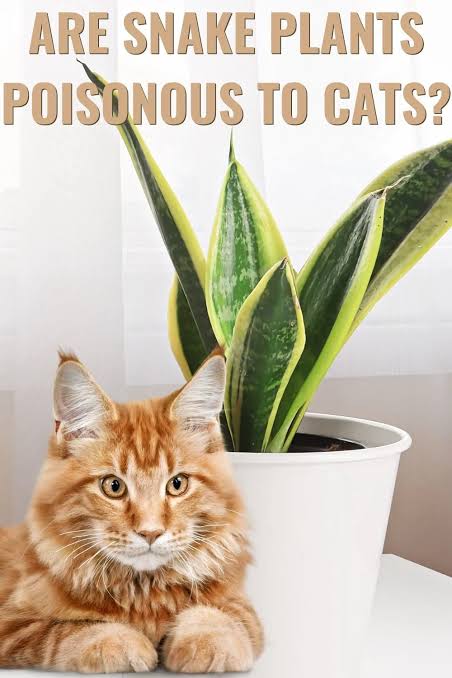In this article, ‘Are Snake Plants Toxic To Cats: See How Snake Plants Can Affect Cats‘, we will explore the Overview Of Snake Plant’s Toxicity To Cats. Also, we will discuss; The Potential Dangers Of Snake Plants For Cats, Understanding The Symptoms Of Snake Plant Toxicity In Cats, Taking Precautions To Protect Your Cat From Snake Plants, Alternatives To Snake Plants That Are Safe For Cats, etc.
Overview Of Snake Plant’s Toxicity To Cats
Snake plants are popular houseplants known for their unique appearance and low-maintenance care. However, if you are a cat owner, you may be wondering whether snake plants pose a risk to your furry friend. Cats are curious creatures and may chew on or ingest plants, so it is important to know if snake plants are toxic to cats.
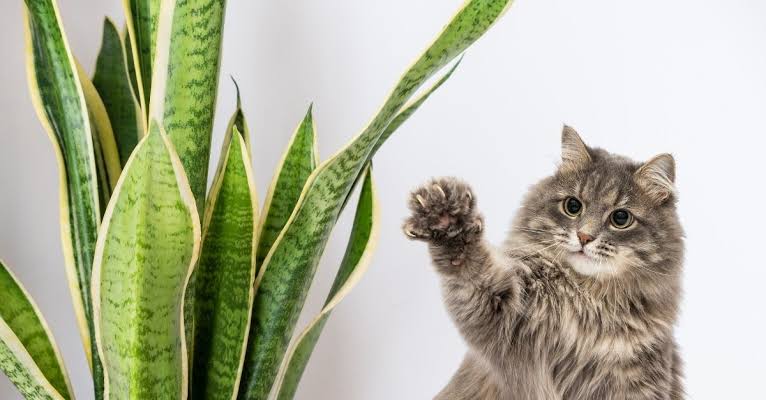
The Potential Dangers Of Snake Plants For Cats
Snake plants, scientifically known as Sansevieria, are popular houseplants due to their low maintenance and ability to thrive in various conditions. However, it is important for cat owners to be aware of the potential dangers that snake plants can pose to their furry friends.
Snake plants contain saponins, which are toxic substances that can cause gastrointestinal symptoms if ingested by cats. These symptoms may include vomiting, diarrhea, drooling, and lack of appetite. In severe cases, cats may experience difficulty breathing, tremors, or even collapse.
If you suspect that your cat has ingested any part of a snake plant, it is crucial to seek veterinary care immediately. The veterinarian may induce vomiting or administer activated charcoal to help prevent further absorption of the toxins. Additionally, supportive care may be provided to alleviate any symptoms and ensure your cat’s recovery.
To prevent potential harm to your cat, it is recommended to keep snake plants out of their reach. Placing them in elevated areas or using hanging baskets can help minimize the risk of ingestion. It is also advisable to monitor your cat’s behavior and discourage them from chewing on any plants within your home.
While snake plants can be a beautiful addition to your indoor decor, it is essential to prioritize the safety and well-being of your feline companion. By understanding the potential dangers associated with snake plants and taking appropriate precautions, you can create a pet-friendly environment in your home.
See Also: Benefits of Having a Cat bed
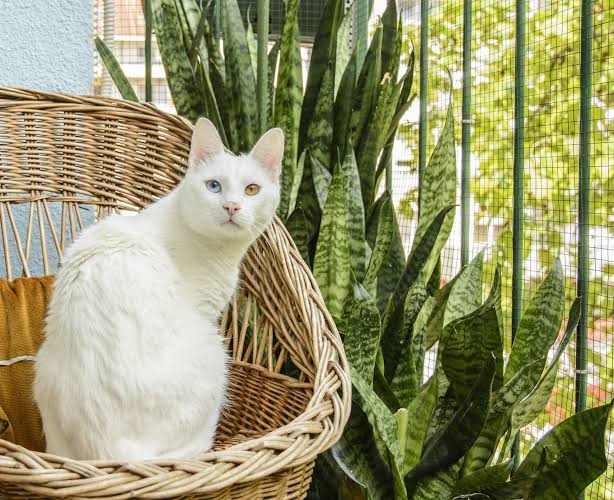
Understanding The Symptoms Of Snake Plant Toxicity In Cats
Snake plants, scientifically known as Sansevieria, are popular houseplants due to their unique appearance and low maintenance requirements. However, despite their beauty, snake plants can be toxic to cats if ingested. It is essential for cat owners to be mindful of the potential risks and to be able to recognize the symptoms of snake plant toxicity.
When a cat ingests any part of a snake plant, various symptoms may occur. These can range from mild to severe, depending on the quantity of the plant ingested and the individual cat’s sensitivity.
One of the most noticeable symptoms of snake plant toxicity in cats is gastrointestinal distress. Cats may experience vomiting, diarrhea, and abdominal pain. These symptoms can occur within a few hours of ingestion and may persist for several days. It is crucial to monitor your cat for these signs and seek veterinary care if they worsen or if your cat shows signs of dehydration or weakness.
In addition to gastrointestinal symptoms, snake plant toxicity can also affect a cat’s respiratory system. Cats may exhibit coughing, wheezing, and difficulty breathing. These respiratory symptoms can be particularly concerning and warrant immediate veterinary attention.
Other less common symptoms of snake plant toxicity in cats may include drooling, loss of appetite, depression, and changes in heart rate. If you observe any of these symptoms in your cat and suspect that they may have ingested a snake plant, it is crucial to contact your veterinarian to seek advice or schedule an appointment for an examination.
More Information
To prevent snake plant toxicity in cats, it is recommended to keep snake plants out of your cat’s reach. Place them in areas that are inaccessible to your feline friends, such as high shelves or hanging planters. Be aware that cats are curious creatures and may still attempt to explore the plant, so it’s important to be vigilant.
While it may be alarming to discover that snake plants can be toxic to cats, knowing the symptoms of snake plant toxicity is vital for providing prompt medical attention. Remember, if you suspect your cat has ingested a snake plant and exhibits any concerning symptoms, contact your veterinarian immediately for guidance and assistance.
See Also: The Top 9 Best Cat Feeders in 2024
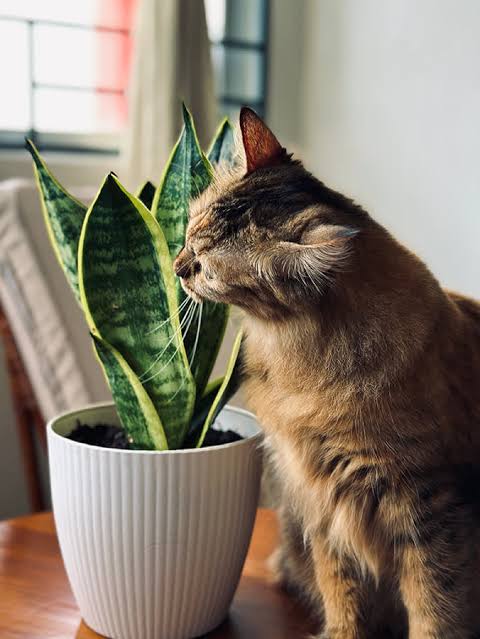
Taking Precautions To Protect Your Cat From Snake Plants
So you just found out that snake plants can be toxic to your cat and you’re freaking out a little bit. Don’t worry, we’ve got you covered. While snake plants may look cool and trendy in your home, they can actually be dangerous for your furry friend. But don’t panic, there are a few simple precautions you can take to keep your cat safe.
First of all, if you already have a snake plant in your home, it might be a good idea to move it to an area that your cat can’t access. This could be a high shelf, a room that your cat isn’t allowed in, or even outside if it’s a suitable climate for the plant. Just make sure that wherever you put it, your cat can’t knock it over or chew on the leaves.
Another option is to create a physical barrier between your cat and the snake plant. You can do this by placing a baby gate or a screen around the plant to keep your cat from getting too close. This way, they won’t be tempted to take a bite of those beautiful green leaves.
If you’re worried about your cat’s curiosity getting the best of them, you can also try using a deterrent spray. There are several brands on the market that are safe for cats but taste terrible to them. Just spray a little bit on the snake plant leaves and your cat is sure to stay away. It’s like putting hot sauce on your pizza to keep your little brother from stealing a slice.
And finally, if you’re still concerned about the potential danger of snake plants, it’s always a good idea to consult with your veterinarian. They can give you more specific advice based on your cat’s individual needs and help you come up with a plan to keep your cat safe and your home stylish.
See Also: Choosing The Right Wood Cat Litter: A Guide To Optimal Pet Care
Alternatives To Snake Plants That Are Safe For Cats
So, you love having plants in your home but you’ve got a furry little friend who just can’t resist taking a nibble. We get it, cats are curious creatures! But don’t worry, there are plenty of great alternatives to snake plants that are safe for your feline friends.
First up, we have the wonderful spider plant. Not only is this plant safe for cats, but it’s also quite a looker. With its long, arching leaves and white stripes, it adds a touch of greenery to any room. Plus, it’s super easy to care for and can tolerate a wide range of lighting conditions.
If you’re looking for something a little more sophisticated, consider the Boston fern. These lush green plants have delicate, feathery fronds that add a touch of elegance to any space. And the best part? They’re totally safe for your cats to be around.
Another great option is the African violet. These pretty little plants produce vibrant, colorful flowers that are sure to brighten up your home. They also happen to be non-toxic to cats, so you can enjoy their beauty without worrying about your furry friend getting into any trouble.
Now, if you’re looking for a plant that’s not only safe for cats but also a natural air purifier, look no further than the areca palm. These tall, tropical plants are like a mini oasis in your home. Plus, they’re great at removing pollutants from the air, so you and your cat can breathe a little easier.
More Information
Last but not least, let’s not forget about the classic catnip. Yes, it’s technically an herb rather than a plant, but it deserves a mention because, well, cats love it! Not only is catnip safe for your furry friend, but it also provides them with endless entertainment. Just make sure to keep it in a secure location, as some cats can get a little too carried away with their catnip obsession.
So there you have it, a handful of safe and cat-friendly alternatives to snake plants. With these options, you can have a beautiful home filled with greenery, without having to worry about your mischievous feline getting into any trouble. Happy plant shopping!
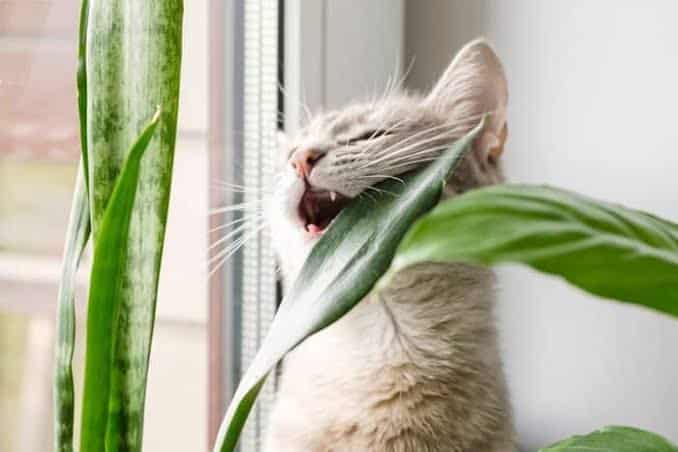
What To Do If Your Cat Ingests Snake Plant Leaves
So, you’ve got a cat who just couldn’t resist taking a nibble on your beautiful snake plant leaves. Don’t panic, it happens to the best of us. While snake plants are known to be toxic to cats, the good news is that most cases of ingestion are not life-threatening.
If you catch your furry friend in the act, start by removing any remaining plant material from their mouth. You definitely don’t want them to ingest any more. Then, it’s time to assess the situation. How much did they eat? Did they just take a small nibble or did they have a full-on feast?
If it was just a small taste, chances are your cat will be just fine. Keep an eye on them for the next few hours and make sure they don’t show any signs of distress. If they start vomiting, having diarrhea, or displaying any unusual behavior, it’s time to take a trip to the vet.
If your cat ate a larger amount of snake plant leaves, it’s best to err on the side of caution and contact your vet right away. They will be able to give you specific advice based on your cat’s health history and the amount ingested.
Remember, prevention is the best cure. Keep your snake plants out of reach from your furry friends, or if that’s not possible, consider using deterrents like placing aluminum foil around the plants or using bitter-tasting sprays. Your cat’s health and safety should always come first!
See Also: 15 Cat Behaviors you didn’t know about
Frequently Asked Questions
1. Are Snake Plants Toxic To Cats?
Yes, snake plants (Sansevieria) contain toxins that can be harmful to cats if ingested.
2. What Is The Toxic Component In Snake Plants?
Snake plants contain saponins, a type of natural detergent. Ingesting saponins can lead to gastrointestinal issues in cats.
3. What Are The Symptoms Of Toxicity In Cats?
Symptoms may include vomiting, diarrhea, lethargy, drooling, and, in rare cases, more severe effects. If you suspect ingestion, seek veterinary attention immediately.
4. How Can I Protect My Cat From Snake Plant Toxicity?
Place snake plants out of reach or in locations where your cat cannot access them. Consider using deterrents or opting for non-toxic plants if you have curious feline companions.
5. What Should I Do If My Cat Ingests Snake Plant Leaves?
Contact your veterinarian immediately. Provide information about the plant, symptoms, and any first aid you’ve administered. Quick action can be crucial in minimizing the impact of toxicity.
6. Are There Snake Plant Varieties Safer For Cats?
While no variety is completely non-toxic, some may have lower saponin levels. Opt for snake plant varieties known for milder toxicity, but still exercise caution.
7. Can Indirect Exposure To Snake Plants Harm Cats?
In most cases, indirect exposure through sniffing or brushing against the plant is unlikely to cause harm. Ingestion is the primary concern.
Conclusion
So, are snake plants toxic to cats? While it’s true that snake plants can be harmful to cats if ingested, the level of toxicity is generally low. However, it’s always better to be safe than sorry when it comes to the health of your furry friend. If you’re concerned about the potential effects of snake plants on cats, it’s always a good idea to carry out more research or consult with a veterinarian. They can provide you with the most accurate and up-to-date information regarding the safety of snake plants for cats.

